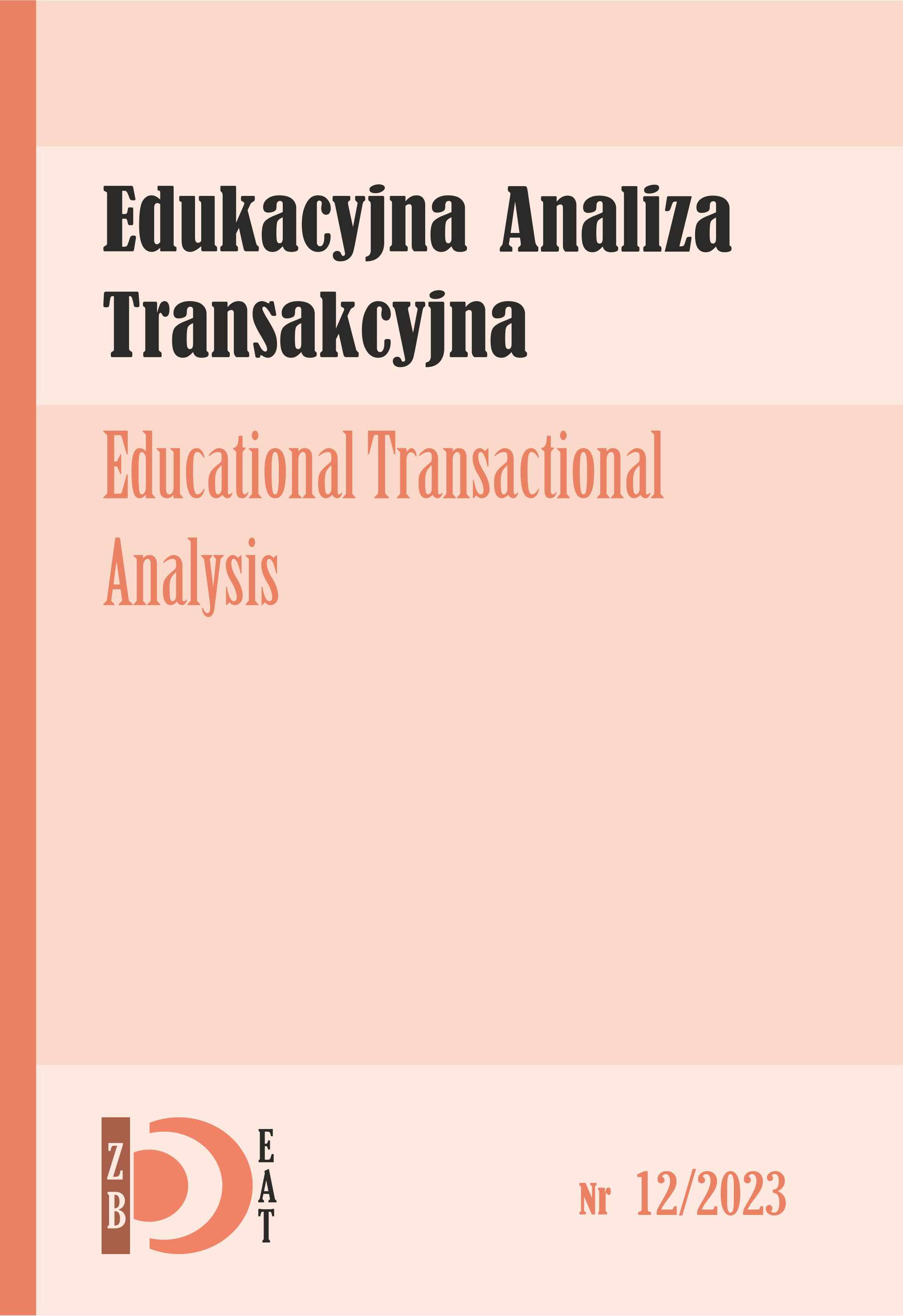Świadomość seksualna a strukturalizacja czasu rozumiana zgodnie z założeniami analizy transakcyjnej. Raport z badań
- Autor
-
-
Weronika Karaś
a:1:{s:5:"pl_PL";s:42:"Uniwersytet Jana Długosza w Częstochowie";}
-
- Słowa kluczowe:
- analiza transakcyjna, strukturalizacja czasu, świadomość seksualna, intymność, dorastanie, relacje
- Abstrakt
-
Artykuł stanowi raport z badań prowadzonych w oparciu o koncepcję strukturalizacji czasu w ujęciu analizy transakcyjnej. Autorka szuka odpowiedzi na pytanie o związek łączący umiejętność budowania relacji, szczególnie tych o charakterze intymnym, przez młodych ludzi z ich poziomem świadomości seksualnej. Badania przeprowadzono na próbie 312 osób w wieku 18-22 lata z wykorzystaniem technik kwestionariuszowych. Główny wniosek z badań wskazuje na występowanie korelacji pomiędzy płcią respondentów a budowaniem relacji o charakterze intymnym. Pomimo tego, iż nie wykryto związku pomiędzy poziomem świadomości seksualnej a budowaniem relacji intymnych przez adolescentów, to ujawniono jej związek z innymi sposobami strukturalizacji czasu.
- Pobrania
-
Statystyki pobrań niedostępne.
- Bibliografia
-
Burns, D.D. (2006). When panic attacks: The new drug-free anxiety therapy that can change your life. New York: Morgan Road Books.
Erskine, R.G. (1997). Theories and methods of an integrative transactional analysis. San Francisco: TA Press.
Goldfried, M.R. (2006). Cognitive-affective-relational-behavior therapy. In: G. Stricker, J. Gold (eds.), A casebook of psychotherapy integration (pp. 153–164). American Psychological Association.
Goulding, R. (1985). History of redecision therapy. In: L.B. Kadis (ed.), Re-decision therapy: Expanded perspectives (pp. 9–11). California: Western Institute for Group and Family Therapy.
Goulding, R.L., Goulding, M.M. (1978). The power is in the patient: A TA/Gestalt approach to psychotherapy. San Francisco: TA Press.
James, M., Jongeward, D. (1971). Born to win. New York: Addison-Wesley Publishing.
Kellogg, S., Garcia Torres, A. (2021). Toward a chair work psychotherapy: Using the four dialogues for healing and transformation. American Psy-chologist, 6(3), 171–180; https://doi.org/10.1037/pri0000149.
Mahmood, F., Flax, E. (2023). Gestalt therapy. In: T. Hanley, L. Winter (eds.), The Sage handbook of counselling & psychotherapy: Fifth edition (pp. 403–409). Sage Publications.
McNeel, J.R. (1975). Redecisions in psychotherapy: A study of the effects of an intensive weekend group workshop (PhD thesis). The California School of Professional Psychology.
McNeel, J.R. (1976). The parent interview. Transactional Analysis Journal, 6(1), 61–68.
Perls, F.S. (1969). Gestalt therapy verbatim. Lafayette: Real People Press.
Perls, F.S. (1975). Theory and technique of personality integration. In: J.O. Stevens (ed.), Gestalt is (pp. 44–69). Utah: Bantam Books.
Rogers, C.R. (1961). On becoming a person. Massachusetts: The Riverside Press.
Stark, M. (1999). Modes of therapeutic action. London: Jason Aronson Inc.
Stuntz, E.C. (1973). Multiple chairs technique. Transactional Analysis Jour-nal, 3(2), 29–32.
Tilney, T. (1998). Dictionary of transactional analysis. London: Whurr Pub-lishers.
Watson, J.C., Goldman, R.N., Greenberg, L.S. (2007). Case studies in emo-tion-focused treatment in depression: A comparison of good and poor outcome. Washington: American Psychological Association.
White, T. (2011). Working with suicidal individuals. London: Jessica Kings-ley Publishers.
White, T. (2016). Evolving theory and practice with the self-destructive individual. In: R.G. Erskine (ed.), Transactional analysis in contemporary psychotherapy (pp. 161–183). London: Karnac Books Ltd.
White, T. (2021). Redecision therapy today: A redecision relational ap-proach to transactional analysis. Kyiv: TA Books.
White, T. (2023). Trauma, memory, and the impact of redecision therapy. International Journal of Transactional Analysis Research and Practice, 14(1), 24–31.
Widdowson, M. (2010). Transactional analysis: 100 key points & tech-niques. New York: Routledge.
Young, J.E., Klosko, J.S., Weishaar, M.E. (2003). Schema therapy: A practi-tioner’s guide. New York: Guilford Press.
- Pobrania
- Opublikowane
- 28.12.2023
- Numer
- Nr 12 (2023)
- Dział
- Analiza transakcyjna w edukacji
- Licencja
-
Prawa autorskie (c) 2023 Weronika Karaś

Utwór dostępny jest na licencji Creative Commons Uznanie autorstwa 4.0 Międzynarodowe.
OŚWIADCZENIE AUTORA:
Mam świadomość, że czasopismo jest wydawane na licencji Creative Commons - Uznanie autorstwa (https://creativecommons.org/licenses/by/4.0/legalcode).
Przesyłając artykuł wyrażam zgodę na jego udostępnienie na tej licencji
Jak cytować
Podobne artykuły
- Karol Motyl, Pracuj albo graj! Pokój nauczycielski w świetle teorii analizy transakcyjnej , Edukacyjna Analiza Transakcyjna: Nr 14 (2025)
- Marika Oracz, Kinga Tworzowska, Paulina Jędrczyk, Anna Pierzchała, Marzenia osób dorosłych. Pierwszy etap charakterystyki z wykorzystaniem analizy transakcyjnej , Edukacyjna Analiza Transakcyjna: Nr 11 (2022)
- Paweł Plaskura, Edukacja w dobie generatywnej sztucznej inteligencji: perspektywa analizy transakcyjnej , Edukacyjna Analiza Transakcyjna: Nr 14 (2025)
- Agnieszka Iwanicka, Media społecznościowe i influencerzy w życiu nastolatków , Edukacyjna Analiza Transakcyjna: Nr 11 (2022)
- Adam Bekier, Integrative approach in transactional analysis as a theory and method in psychotherapy , Edukacyjna Analiza Transakcyjna: Nr 13 (2024)
- Zbigniew Wieczorek, Depresja w świetle teorii analizy transakcyjnej - analiza mediów społecznościowych przy pomocy Big Data , Edukacyjna Analiza Transakcyjna: Nr 8 (2019)
- Jacek Szedel, Bożena Wieczorek, Estymacja stanów ego: perspektywa uczenia maszynowego , Edukacyjna Analiza Transakcyjna: Nr 12 (2023)
- Anna Pierzchała, Sytuacja rodzinna w okresie dzieciństwa i dorastania a działania skryptowe w ujęciu analizy transakcyjnej. Raport z badań , Edukacyjna Analiza Transakcyjna: Nr 11 (2022)
- Tony White, Technika pustego krzesła i jego użycie w psychoterapii , Edukacyjna Analiza Transakcyjna: Nr 12 (2023)
- Dorota Pankowska, dr hab., Analiza transakcyjna w edukacji czy edukacyjna analiza transakcyjna? , Edukacyjna Analiza Transakcyjna: Nr 1 (2012)
Możesz również Rozpocznij zaawansowane wyszukiwanie podobieństw dla tego artykułu.


